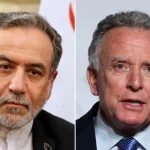

JERUSALEM — President Joe Biden raised U.S. concerns over settlement expansion in the West Bank with Israeli leaders ahead of his visit to the Palestinian territories on Friday, a step that may begin to appease some Democrats who have been sharply critical of his stance toward the Jewish state.
Biden’s approach comes one day after he charged that some Democrats were “wrong” for their position on the Israeli-Palestinian conflict, pushing back on the party’s left flank.
“It was a very constructive exchange between our side and the Israeli side,” a senior administration official told reporters Thursday.
BIDEN SAYS HE IS ‘NOT GOING TO WAIT FOREVER’ FOR IRAN AFTER RAISING IDEA OF MILITARY FORCE
Biden is expected to make several economic and humanitarian aid announcements during stops in East Jerusalem and the West Bank and will meet with Palestinian President Mahmoud Abbas. But his steadfast support for Israel and embrace of economic normalization steps with Arab states are unlikely to alleviate Palestinian concerns and stem intraparty divisions.
The issue has roiled Democratic Party members and supporters, some of whom have urged Biden to use the weight of the U.S. government to pressure Israel over its handling of the Palestinian territories.
When the conflict between Israel and Hamas flared last year, left-wing lawmakers heaped pressure on Biden to speak up in support of the Palestinians. The president spent nearly 10 minutes huddled on the tarmac with Rep. Rashida Tlaib (D-MI) before a visit to her state after she accused him publicly of failing to hold Israeli leaders accountable for the death toll.
Tlaib, the only Palestinian American to serve in Congress, has blamed the United States for enabling Israel’s “apartheid government.” Others have called for viewing the conflict through a racial justice lens.
These positions have also divided Democratic donors in some congressional primary races.
Biden has said he supports a two-state solution to the conflict, urging during a press conference on Thursday a “lasting negotiated peace between the State of Israel and the Palestinian folks.”
Two states alongside one another “remains, in my view, the best way to ensure the future of equal measure of freedom, prosperity and democracy for Israelis and Palestinians alike,” Biden said in remarks after arriving in Israel one day earlier.
Yet in the same breath, Biden conceded that he does not expect any progress “near term.”
Calling himself a Zionist and stalwart friend of Israel, the president bucked his party’s Left wing more openly during an interview with Israeli television later that day.
Biden fired back at members of his party who view Israel as an “apartheid state” because of its handling of the Palestinian territories, denouncing them as “wrong.”
“There are a few of them,” Biden told Channel 12 News. “I think they’re wrong. I think they’re making a mistake.”
When Biden travels to East Jerusalem and Bethlehem Friday, he will meet Palestinian leaders frustrated by his administration’s approach to the conflict after four years under former President Donald Trump.
Among the issues is Biden’s embrace of the Abraham Accords, the diplomatic and economic normalization agreements between Israel and several Arab states.
Brokered by the Trump administration, the deals are viewed as isolating the Palestinians by superseding a 2003 initiative that offered as an incentive to Israel the prospect of broad Middle East normalization in exchange for a negotiated final status accord.
America’s support for a path that pulled away this leverage has fueled feelings of betrayal and abandonment in Gaza and the West Bank.
While visiting with leaders in the West Bank, Biden plans to announce $316 million in new funding for the Palestinian people, according to the White House, along with steps toward 4G internet development in the territories, support for refugees, and humanitarian assistance.
Biden will also share with Palestinian President Mahmoud Abbas Israel’s plan to convene the Joint Economic Committee with the Palestinians, a forum to discuss economic issues in the West Bank, and an increase in the number of visa permits for Palestinians in Gaza to work and conduct business in Israel.
During a visit to the Augusta Victoria Hospital in East Jerusalem, the president will also commit new funding for the East Jerusalem Hospital Network, a measure the Biden administration is pairing with reforms.
“It has been a priority for President Biden to rebuild ties with the Palestinians that were severed by the previous administration,” a senior administration official told reporters Thursday. “If you add up the totality of what we’ve done, there’s really no comparison to what we inherited.”
Despite the White House’s assurances, few expect the measures to overcome Palestinian disappointment. Notably, the president will not be meeting with the family of Palestinian American journalist Shireen Abu Akleh, who was shot by Israeli gunfire this year.
CLICK HERE TO READ MORE FROM THE WASHINGTON EXAMINER
Biden, who is midway through a four-day Middle East visit, will next travel to Saudi Arabia to urge the kingdom to take steps toward normalization with Israel, arriving there on a highly symbolic direct flight.
The move is another likely disappointment for the Palestinians, who have long relied on Saudi Arabia’s leaders as a bulwark for their cause.






